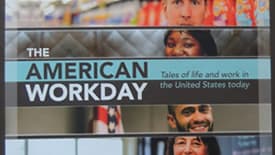Recent grad publishes book profiling American workers

“The American Workday” is a publication that presents a modern portrait of the nation’s economy, as painted by the workers who keep it moving. Its publication is a result of efforts by UNC Charlotte alumnus Austin Halbert.
A Levine Scholar, Halbert graduated in May with a bachelor’s degree in management (organizational management concentration) with a minor in economics. “The American Workday” was funded through a grant from the Levine Scholars Program, which enabled Halbert and fellow scholars Laura Outlaw and Vrushab Gowda to complete the work.
According to Halbert, he embarked upon the publication project to give him a more complete understanding of economics beyond what he was learning in class.
During a three-year period, Halbert and his colleagues interviewed and photographed 38 diverse workers across American occupations. Interviewees included workers from stock clerks to Fortune 500 executives; they were citizens from varied backgrounds who told him about the realities behind their jobs. He said they dispelled misconceptions about their work, while offering stories about how the conditions of their occupations have affected their lives.
“The America I saw when I spoke to these workers was extraordinary. They were unified in their resilience, their continued optimism, their desire to work towards a better life for themselves and the people around them,” Halbert said. “However, there were also such clear divides. Inequalities of income, race, gender and nationality were common themes, as it was evident that many of those I spoke with had been held back by their differences. Hopefully, when their stories are put side-by-side, people can see that one’s background has nothing to do with one’s character. Their labels do not define who they are as people and as Americans.”
“The American Workday” is available for sale on Amazon in hardcover and e-book formats. Proceeds from its sale will benefit Charlotte Works and Hired Heroes, two organizations working to eradicate unemployment by matching jobless citizens with workforce training opportunities.